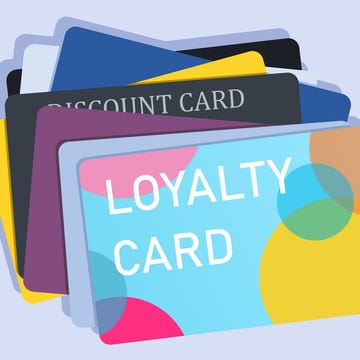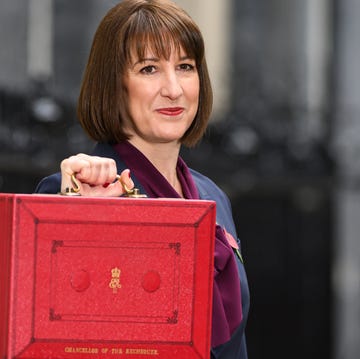If you are applying for a mortgage, credit card or loan, taking out a new mobile phone or energy contract, paying your car insurance monthly or even opening a new bank account, then you’ll want to make sure your credit score is in tip top condition.
Your credit score plays a crucial role when lenders decide whether to lend you money, how much they are going to offer you and what interest rate they are going to charge. In short, it helps them decide if you are likely to be a reliable, trustworthy customer and if you are going to manage your credit responsibly.
What is a credit score?
James Jones, head of consumer affairs at Experian, says: “Your credit score is a three-digit number that reflects how reliable you are when it comes to repaying money, based on how you’ve managed your finances in the past. The higher your credit score, the more likely you are to be accepted for loans, credit cards, mortgages and other finance."
James explains: “Interest rates are usually personalised to an individual and their circumstances, including their credit score. This is why it’s crucial for you to look after your score and understand the ways in which you can improve it. Having a strong credit score will allow you to save money in the long term by benefiting from the best rates."
"Applying for credit is similar to applying for a job," says Craig Tebbutt, chief strategy & innovation officer, Equifax UK. "Your credit file serves as a financial CV for lenders to see your credit history and confirm you’re responsible with credit."
Who sets credit scores?
Credit scores are a quick way for you and lenders to see your financial health when it comes to borrowing. There are three main credit reference agencies in the UK - Equifax, Experian and TransUnion (previously Callcredit) - and they all hold information about your borrowing history, from any credit cards, loans and mortgages you have, as well as bank accounts, overdrafts and mobile phone contracts. Your credit report will show how good you are at managing debt by showing your monthly repayments, your credit balances and if you have ever missed a repayment.
Lenders use financial data provided by at least one of these nationwide agencies when making a decision on applications for credit, and as the information they hold on you may differ, so will the credit scores. You don't have any control over these scores, but you do have control over the accuracy of the financial data they have, so it's a good idea to check your files regularly.
You want your financial CV to be in the best possible condition, so it's important the information which the credit reference agencies hold is correct and up to date. Everyone is entitled to see their credit report for free, but if you want to sign up for alerts and to get a credit score, you might need to pay a monthly subscription, although many offer a free trial first.
How to check your credit score
You can check your credit score and credit report directly with the three credit reference agencies in the UK - Equifax, Experian and TransUnion (previously Callcredit) and there are also third party companies such as ClearScore or Credit Karma).
It is a good idea to do a proper check of your credit report initially, which gives you the full pictures, and then sign up for free alerts which will let you know if your credit score has changed. Remember, the credit score itself is only a quick snapshot of your overall credit health set by the agencies, and lenders will check your report itself when deciding whether to lend you any money or not.
Check your credit report with Experian
Experian offers a 30 day free trial, and then it's £14.99 a month afterwards. You can also get a free, statutory report showing your credit history but without alerts or a credit score. You can also sign up for free to Experian and just get your credit score once a month.
Check your credit report with Equifax
Equifax offers a 30 day free trial, and then it's £14.95 a month afterwards. You can also get a free, statutory report showing your credit history but without alerts or a credit score. You can also check your Equifax credit scores and reports which are updated once a month, with Clearscore.
Check your credit report with TransUnion
You can check your TransUnion credit report with Credit Karma. You can also get a free, statutory report from TransUnion showing your credit history but without alerts or a credit score.
If you want to check all three agencies at once, then you can sign up to Check My File which has information about you from all three. There's a 30 day free trial, and then it's £14.99 a month afterwards.
How to improve your credit score
Join the electoral roll
This is the easiest step you can take to improve your chances of being accepted for credit: get on the electoral roll. Prospective lenders and credit reference agencies use this to check you are who you say you are and live where you say you live. If you move, always make sure your credit record shows correct address details and use that same address when making credit applications. Join the electoral roll via gov.uk.
Never miss a payment
Avoid missing repayments or making them late (for anything from mortgage to utility bills), otherwise they will stay on your credit record for up to six years (although their impact on the score lessens over time). Experian says missing just one payment could wipe 130 points off your score.
Don't max out your cards
Try to pay off more than the minimum repayment every time if you can. This shows prospective lenders you are managing your debt well and taking a responsible attitude.
Keep an eye on how much of the total amount of credit available to you you are using - this is called your credit utilisation. "Keep your credit utilisation low," says Experian's James Jones. "For example, if you have a limit of £2,000 and you’ve used £1,000 of that, your credit utilisation is 50%. Usually, a lower percentage will be seen positively by lenders, and will increase your credit score as a result. If possible, try and keep your credit utilisation below 30%."
Don’t apply for credit too often
Having a loan and making repayments on time is a good way of showing lenders you can be trusted, but having too many credit accounts might suggest to lenders that you are in financial difficulty, says Craig Tebbutt. "Every time a lender runs what’s known as a ‘hard credit search’ when you apply for a new line of credit, it leaves a footprint on your credit report that other lenders can see. Always ask for a ‘soft credit search’ before applying for credit, and if you are declined, take a look at your credit report before applying again to see if there’s an issue that needs to be addressed."
Make your rent payments count
"Paying rent on time is a great way to show potential lenders that you are responsible with money, but you will need to set up through a third party to ensure your payments are recorded on your credit report. Apps like Canopy, Credit Ladder or Bits allow you to record these payments while improving your score," says Craig.
Use your subscriptions to boost your score
You can also sign up to Experian's 'Boost' service, which looks at payments you make to multi-media subscription services such as Netflix and Amazon, and makes them count towards boosting your credit score.
Never pay for a credit repair company. If you need help with debt, go to a free debt agency such as National Debtline or Stepchange.org or read our comprehensive debt feature.
Think carefully before closing old accounts
Credit cards can be a barometer of your financial health and can have quite an impact on your credit score. "For credit scoring purposes, there is no such thing as too much credit, just too much debt, so if you have a credit card with a healthy credit limit and minimum use and decide to close it, you could inadvertently impact your credit score by taking available credit away from the calculation that lenders make," says James.
For example, if you have a credit card with a £10,000 limit which you never use, and a £1,000 debt on another credit card with a £2,000 limit, your debt utilisation is 8%, but if you close the unused card your debt utilisation instantly jumps up to 50%, which is seen as more risky by lenders.
Challenge mistakes
Errors on your credit report will affect your ability to borrow, and if you don't get them corrected you may find it harder to get credit in the future. Review the information on your credit report and make sure it reflects the facts. If you spot any errors, contact the credit reference agency immediately to discuss your report and get any mistakes corrected.
Separate financially from your ex
A staggering 47% of people who have ended long-term relationships don’t know how to financially break up with their exes, according to Experian research. You may not realise it, but if you have a joint bank account or mortgage with your partner (or flatmate), you become ‘financially linked’ to them. If they have a bad credit rating, it could impact yours too so keep your finances separate.
If you split up, divorce or move out, close all joint financial products, and let all three credit reference agencies know. Otherwise, your ex’s financial dealings could still have an impact on your credit score!
Moved house?
Remember to update your address with any credit cards, mobile phone providers, etc., when you move.
Always check your eligibility before applying for credit
Before you apply for a financial product, you can check how likely it is you will get the credit deal you want without it appearing as a 'hard' search on your file. All credit reference agencies offer eligibility calculators broken down by different financial products (eg mortgage, credit card) - these are also known as 'soft' searches. You can see your percentage chance of being accepted for specific deals. Check Experian's eligibility checker and Moneysavingexpert's loans and credit cards eligibility calculator.
What about if you don't have a credit report at all?
If you don't have a credit card or any of the household bills in your name, or possibly even a bank account of your own, you could find there is insufficient information for you to be assessed on when applying for credit, known as 'credit invisibility'. A report by Experian in 2022 found that there were 5 million 'credit invisible' people in the UK who were at risk from being excluded from everyday finances, simply because they had no credit rating. This could be for a number of reasons, and the report found that it wasn't just people on the poorest incomes which were affected by this issue. Reasons for being credit invisible were:
- Young people who have not yet established a credit record.
- Older people who may have either paid off their mortgage and have limited use for credit, or who have not previously relied on credit and, therefore, have no file.
- Recent immigrants (or potentially returning expats) who may have little or no credit footprint, and therefore struggle to open bank accounts and/or rent property.
It's worth addressing all of these to improve your credit score, but don't start borrowing beyond your means just to get a credit rating.
A good way to start building up a credit score is to open a bank account, such as a current account, or put your name on some of your household utility bills, such as gas, water and electricity. Another option is to take out a credit card, use it a few times a month, and pay off the balance in full with every statement. That way, you are building up a credit history but not building up any debt.














